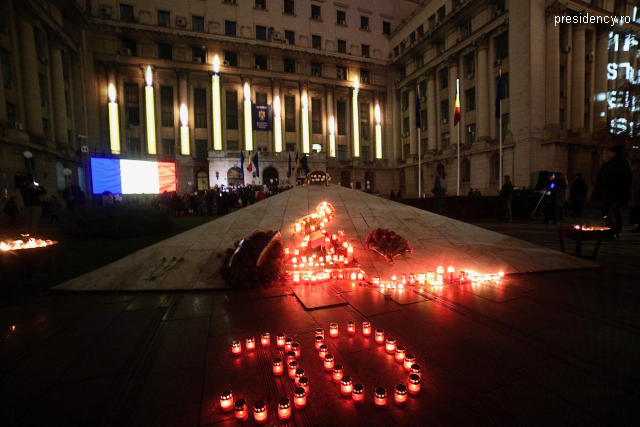The victims of the anti-communist Revolution, commemorated
Romanians have commemorated the heroes killed during the 1989 anti-communist uprising

Bogdan Matei, 23.12.2019, 14:00
Thousands of Bucharesters took part in a march on Sunday evening, in memory of the people killed during the anti-communist revolution of 1989. The head of state, Klaus Iohannis and Prime Minister Ludovic Orban also marched with the crowd through Bucharests central boulevards, the stage of the violent confrontations 30 years ago. US Ambassador Adrian Zuckerman and British Ambassador Andrew Noble have also taken part in the march, and were among those who read the names of the heroes during a solemn ceremony held in front of the former headquarters of the communist party.
It was on top of that building that on December 22, 1989, under the pressure of the hundreds of thousands of protesters, dictator Nicolae Ceausescu boarded a helicopter and tried to flee. Captured, subjected to a brief trial and executed on December 25, in a military facility in Targoviste, in southern Romania, Ceausescu left behind a country in ruins and a lot of victims. As many as 1,142 people were killed in the uprising, over 3 thousand were seriously injured several hundreds were arrested illegally and tortured.
Most protesters were killed and injured after Ceausescu fled. At the time, the culprits were believed to be some so-called terrorists, loyal to the dictator, whose identity has never been revealed. Military prosecutors, who sent the Revolution case to Court, accuse Ion Iliescu, a former minister during Ceausescu’s regime in the 1970, who then fell into disgrace and who was regarded, in December 1989, as the political leader of the regime change, of having created, together with some of his collaborators, a genuine terrorist psychosis, which led to the loss of many lives. The massacre, meant to legitimize the new power, had the expected result. In May 1990, at the first free elections after the fall of communism, Iliescu got 85% of the votes in the first round. His party, called the National Salvation Front, a mixture of real revolutionaries and former communists, got two thirds of the seats in the newly created Parliament. According to prosecutors, Iliescu’s team “was set up as a dissident group, aimed at removing Ceausescu from power but maintaining Romania in the sphere of influence of the USSR.”
Romanian President Klaus Iohannis said on Sunday, when 30 years since the anti-communist revolution were marked, that the people responsible for the bloodshed must be brought to justice. He urged Romanians to speak loud and clear about December 1989 because the best way to never forget is to constantly talk about what happened. He promised he would continue to militate for the preservation of the national memory, to honor the sacrifice of the Romanian heroes and to defend the values of democracy and of the rule of law.
(Translated by Elena Enache)






























